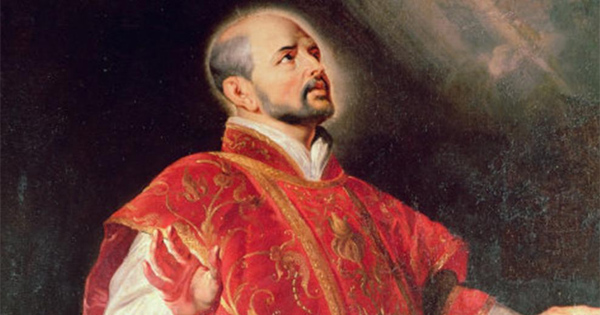What are you afraid of? Coronavirus and the Ignatian Spiritual Exercises

What are you afraid of? Coronavirus and the Spiritual Exercises of St. Ignatius
If you’re put off by the title of today’s post, go ahead and skip it. I’ll be back tomorrow with our regularly scheduled secular programming.
Over the past two days I drove from Sacramento to San Diego and back to extract my son from his college dorm. The trip was long but the scenery was nice, and I accomplished the mission. Both my baby birds are now back in the nest. It was hard to not visit my in-laws while in San Diego; we mutually agreed to keep our distance because of the risk. When I arrived home last night, my stomach was in knots and my feelings in turmoil. At bedtime I tried and failed to sleep with my thoughts spinning wildly. (I’m sure some of you have had the same experience this week.) I tried something like relaxation, something like prayer, something like reflection.
Then clearly, loudly, the question came into my mind: What are you afraid of?
Now, this might be a sensible question that any good therapist would ask of an anxious patient. Maybe I was just doing a good job of self-analysis. But as a Christian, I have to allow the possibility that this is how God speaks to me.
I was primed to recognize this possibility. For eight months last year, I did an “everyday life” retreat called the Spiritual Exercises with my beloved spiritual director Fr. David Ayotte, SJ. In this retreat, I prayed and reflected my way through a unique and powerful set of “exercises” invented by St. Ignatius of Loyola, the 16th century founder of the Society of Jesus, an order of Catholic priests better known as The Jesuits. It’s far beyond the scope of my little blog post here to explain the Spiritual Exercises of St. Ignatius, or the totality of Ignatian spirituality. If you’re interested, I highly recommend The Jesuit Guide to Almost Everything by James Martin.
What’s relevant here is I had learned a type of Ignatian prayer exercise called colloquy, in which you basically close your eyes and imagine yourself in a conversation with God (possibly in the person of Jesus). You let your thoughts wander freely and listen to what God has to say to you. I felt that with this question, God had just initiated a colloquy with me.
What was I afraid of?
I started a list. Certainly I was afraid I could die of COVID-19.
Really? God asked.
I thought about it. Well, maybe not really. A rough estimate of the likelihood that I will be infected by coronavirus, multiplied by the odds I would die of that infection, yields at most a 1 in 200 chance. And whatever the actual odds, I didn’t really feel a visceral fear about that. What about my husband and kids? The more I thought about it, kind of the same deal.
What are you afraid of?
I was afraid for my parents and in-laws. But afraid of what? Obviously I am concerned about their health. Then I dug deeper. I’m afraid of not being there if they need me. I’m afraid of letting them down.
What are you afraid of?
I started to touch the deep fears, the ones I was ashamed of. I’m afraid of the financial suffering that swirls around us, afraid that it could touch me or if not me, it will demand my generosity. I’m afraid of losing privileges I’ve come to expect, like traveling for vacation. I’m afraid of missing the things about consumer society that I enjoy, such as dining out. I am afraid of change because I have it good.
I had named my fears, my REAL fears, and my eyes were opened. I am grasping at the life I know, and closing myself to the possibility of new life.
Don’t misunderstand me. A pandemic is not a “good thing” or “God’s will.” Not everything will “be okay.” Some of the changes that come from this experience will be horrible and tragic and clearly bad. But Ignatius invites us to find God in all things, and to be indifferent to the particular circumstances. This call to detachment is much more than looking on the bright side. It’s much more than saying, don’t worry about the things you can’t control.
Ignatius’s prayer called The First Principle and Foundation summarizes how we are called to look beyond our particular circumstances and dedicate ourselves and our awareness to what is of ultimate importance:
“For this it is necessary to make ourselves indifferent to all created things as much as we are able, so that we do not necessarily want health rather than sickness, riches rather than poverty, honor rather than dishonor, a long rather than a short life, and so in all the rest, so that we ultimately desire and choose only what is most conducive for us to the end for which God created us.”
In a time of pandemic, in a time of peace, in any time—we are called to be who God created us to be. Last night I glimpsed this reality, and my fear (mostly) slipped away.
I’ll wrap this up with a pop culture reference that some of you may find relevant, words from Gandalf in the Lord of the Rings movies, and another prayer from St. Ignatius.
“I wish it need not have happened in my time,” said Frodo. “So do I,” said Gandalf, “and so do all who live to see such times. But that is not for them to decide. All we have to decide is what to do with the time that is given us.”
Suscipe prayer of St. Ignatius
Take, Lord, and receive all my liberty, my memory, my understanding and my entire will. All I have and call my own, You have given to me; to you, Lord, I return it. Everything is yours; do with it what you will. Give me only your love and your grace. That is enough for me.
————————————————–
Learn more about Amy Rogers and her books at AmyRogers.com
0 Comments
Share this:


0 Comments